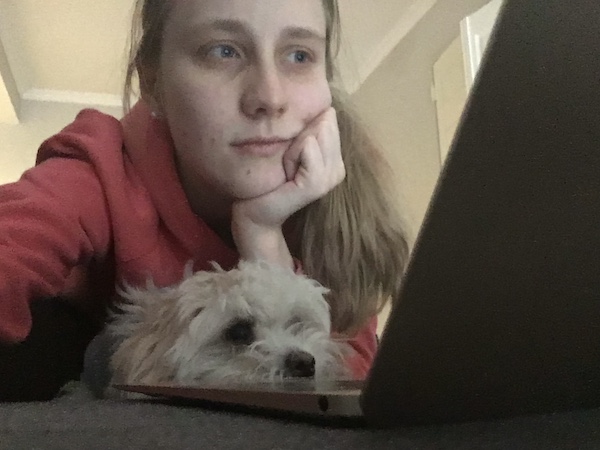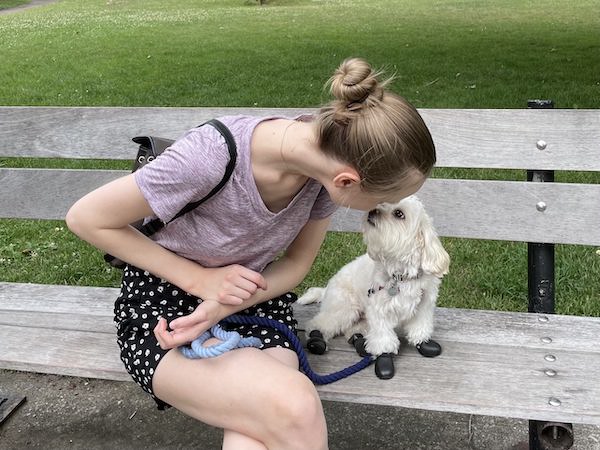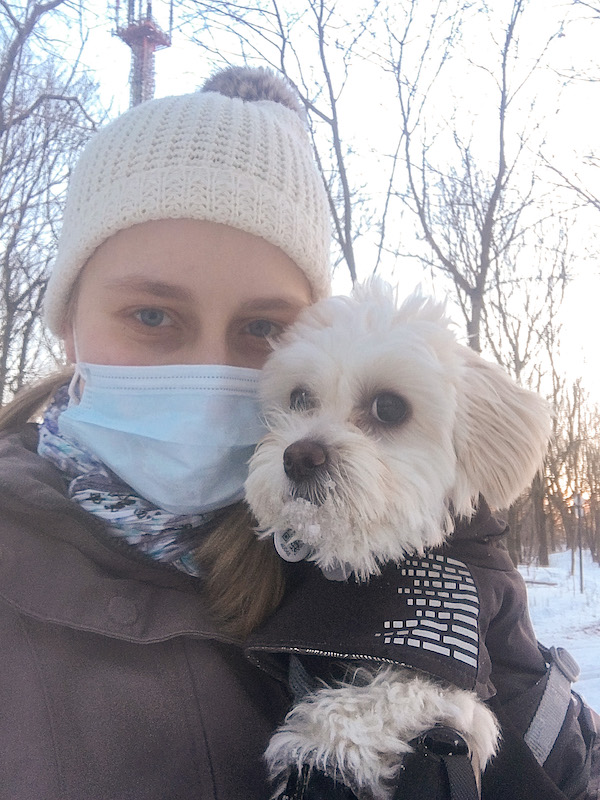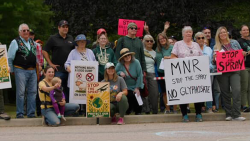
A long, high-pitched cry startled me awake. It was coming from the black crate in my room where a little cream-coloured ball of fluff lay. I looked at my phone and saw the time (4:02 a.m.) glaring back at me.
Then, as I had been doing several times a night since October 2020, I groggily opened the crate door to take the puppy out to the bathroom.
Getting woken up several times a night like this would usually put me in a bad mood, but now it seemed such a small price to pay compared to all the good my dog brought into my life.
His name is Flurry (like a snow flurry, not a McFlurry), and he is 3.5 kilograms of love and the best thing that’s happened to me since the pandemic began.
As a child, I always knew that someday I’d get my own furry friend, but not this soon into my adult life and definitely not in the midst of a very intense and incredibly stressful graduate program during a global pandemic. I didn’t mean to jump on the pandemic puppy bandwagon when I got him, but isolation and sadness during COVID-19 got a hold of me, and so I craved a canine companion. He came a little sooner than anticipated, but right when I needed him most.
‘I felt like I was slowly drowning and Flurry was about to be my lifebuoy.’

When I picked up 10-week old Flurry more than a year ago, I hadn’t seen my family and most of my friends in six months. I was spending most of my days alone in my bedroom, either attending classes on Zoom or stressing about them.
I grappled with anxiety as I tried to balance the demands of grad school and living alone during the COVID lockdowns, experiencing low self-worth whenever I failed.
According to a survey by The GenWell Project and the University of Victoria, 66 per cent of young people born — like me — between 1997 and 2015 have felt lonelier since the start of the pandemic. It’s the highest rate of loneliness amongst all generations.
Like many, I grieved for the personal support network that COVID-19 had ripped apart, the lost company of those I loved most, and the missed comfort of familiar faces and routines.
Perhaps, to an outside observer, it was not the time to throw a needy, messy puppy into the mix. But I felt like I was slowly drowning and Flurry was about to be my lifebuoy.
From the very first day I brought him home, he kept me on my toes. He was a wide-eyed, bouncy pee machine with the stubbornness of his shih tzu mom and the smarts of his toy poodle dad. He did all the puppy things – whine at night, steal my socks and chew on just about anything, including the wooden baseboards. But his clumsiness made me laugh, his playfulness had me enjoying myself again, and I felt proud watching him grow. It was the honeymoon phase of puppy parenthood.
‘He kept me rooted in the present at a time when my mind constantly plunged me into the very scary what ifs of the future.’

During those early days, and as Flurry entered the dog equivalent of the terrible teens, he needed constant surveillance. So we did everything together. He was my plus one, including every day of Zoom school.
To juggle raising him and getting schoolwork done, I hustled between the floor where my young dog played and my desk where I took all my virtual classes.
It was a balancing act I was thankful for. When no one else could convince me to walk away from my desk from time to time, Flurry could. Because, yes — running after a puppy, preparing his food and teaching him tricks provided much-needed mental breaks from the intensity of staring at my screen for countless hours of Zoom calls each week.
Several times, I had people ask me: “How are you getting anything done? Isn’t he distracting you?” And the answer was: Yes. For sure he was distracting me.
But when I got a call from home in the summer of 2021 that my dad had been diagnosed with a terminal degenerative illness, Flurry was the distraction that kept me afloat. The time I devoted to my pup kept me from falling deeper into my anxiety and loneliness. There was no mental space left for intrusive or negative thoughts. He kept me rooted in the present at a time when my mind constantly plunged me into the very scary what ifs of the future.
‘He brought with him an undeniable, contagious joie de vivre and showed me that you can never truly be lonely when in the company of a warm puppy.’

My dad’s illness was a hard one to handle all alone within the confines of my bedroom, but Flurry’s presence helped me grieve the father I knew.
I desperately sought the company of family and the warmth of their embrace to navigate the loss. Flurry delivered. His warm kisses were healing. I found comfort in hugging him. I told him how my dad was slipping through my fingers and he listened.
A study from Australia suggests that the physical touch and exchange owners can have with their dogs might explain why dog ownership during the pandemic has significantly protected pet people against loneliness.

When getting up some mornings felt hard, I owed it to Flurry — if not to myself — to do so anyway. There was, after all, a fluffy pooch waiting to be walked, fed and played with! Pets have helped increase their owners’ sense of purpose during the pandemic, according to a U.S. study published this year in the journal Animals on the influence of pet ownership during COVID-19.
Flurry asked for little more than a bowl full of food, a warm bed to sleep in and a regular dose of head scratches. But I felt a sense of purpose in making sure he got more.
So, amidst the loss I felt through everything, Flurry’s authentic, unconditional, uncomplicated affection was an incredible gain. He taught me I was worth it just by being. He loves me as I am. With him, there is no need to impress, no need to pretend. There are no snide remarks, no judgements.
He boosted my sense of self-worth in a way no one else could and steadied the ship that was my life. He brought with him an undeniable, contagious joie de vivre and showed me that you can never truly be lonely when in company of a warm puppy.




